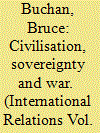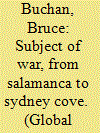| Srl | Item |
| 1 |
ID:
072481


|
|
|
|
|
| Publication |
2006.
|
| Summary/Abstract |
In recent international relations (IR) literature and foreign policy, the concept of civilisation has enjoyed a surprising revival. Its recent use, however, has had little reference to those who did most to introduce it into modern thought, the thinkers of the Scottish Enlightenment. A re-examination of their thought suggests the need for a more nuanced view of civilisation, one that appreciates that the promise of domestic peace that comes with civilisation is also laden with the peril of war and new dynamics of international order. This article will focus on how David Hume (1711-76), William Robertson (1721-93), Adam Smith (1723-90) and Adam Ferguson (1723-1816) framed their understanding of civilisation and the civilising process in Europe. It will be argued that they were animated by the need to identify the processes at work in reshaping Europe, giving rise to a new international order of civilised societies and mighty sovereign states. Civilisation thus emerged as a process not simply of domestic refinement and pacification, but of the emergence of a new kind of international order between militarily powerful, 'civilised' and 'civilising' sovereign states with enhanced capacities for waging war.
|
|
|
|
|
|
|
|
|
|
|
|
|
|
|
|
| 2 |
ID:
086621


|
|
|
|
|
| Publication |
2009.
|
| Summary/Abstract |
Australia's colonisation by Britain (from 1788) was accomplished without the 'consent' of the Indigenous inhabitants, or the negotiation of any kind of treaty. The violence of the colonisers against the Indigenous inhabitants was never officially acknowledged to be a form of 'conquest' or 'war'. This was in part due to the fact that the Indigenous inhabitants of Australia were not regarded by the colonisers to be subjects against whom a war could be waged. Australia's early colonisation offers an example of the conceptual myopia in the development of European discourses of international relations. Within these discourses, warfare was seen as an increasingly disciplined form of violent engagement between the subjects of sovereign states. European thinkers thus came to see 'the subject' of war as a self-disciplined, rights-bearing individual inhabiting a civil space underwritten by relations of private property and guaranteed by the sovereign state. In this way, the subject of war was differentiated from the undisciplined violence of non-subjects - those in rebellion against their sovereign, or those who were without sovereignty altogether. By the eighteenth century, this constellation of concepts was framed by notions of civilisation which tied the subject of war to an historicised account of the difference between supposedly 'civilised' societies and so-called 'savage' peoples. In this paper I will argue that notions of civilisation are central to our understanding of the development of IR discourse.
|
|
|
|
|
|
|
|
|
|
|
|
|
|
|
|